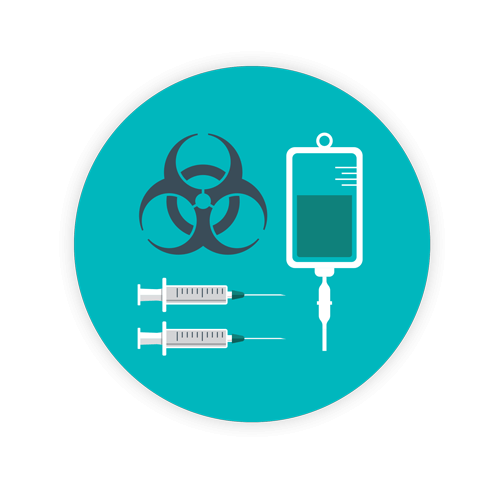Importance of Hospital Waste Management

Editor’s note: This post was originally published in November 2020 and has been completely revamped and updated for accuracy and comprehensiveness.
The importance of hospital waste management cannot be overstated. In every hospital, each healthcare worker has a vital role to play in hospital-based waste management and the core areas that it impacts – safety, sustainability, efficiency, compliance, and education.With a solid grasp of the importance and impact of hospital waste management, you’ll be ready to contribute to a safer, greener healthcare system.
TOPICS WE WILL COVER:
1 / Understanding healthcare waste
2 / The importance of hospital waste management
3 / Let your hospital waste management have a positive impact
Are you looking for help with hospital waste management?
Sharpsmart offer tailored solutions for all types of medical waste, whether you need an expert clinical waste disposal service, a fully managed sharps disposal service, help with offensive waste or cytotoxic waste disposal, we can help.
And our Four Walls approach to hospital waste management is much more than providing bins and collection, it means you’re fully supported as our experts work alongside clinical staff to drive outcomes that align with the NHS Clinical Waste Strategy.
If you’re looking for more information on the importance of hospital waste management and how it affects the five needs of healthcare, please read on…
Understanding Healthcare Waste
It’s crucial for all healthcare workers to have a solid understanding of healthcare waste, this involves knowing the different waste streams that fall within it, as well as knowing how to identify, classify, and manage waste correctly. This is especially important when it comes to infectious and hazardous waste types as misclassification can have terrible consequences.
Interestingly though, the more common feature within most hospitals is overclassification – resulting in high costs for overtreated waste and a significant increase in otherwise avoidable CO2 emissions. In either case, improper waste management and disposal has a detrimental effect on healthcare workers, the public, and the environment. The potential impact and consequences of mismanaged healthcare waste help us to understand why it’s so important we get it right.
The Importance of Hospital Waste Management
The importance of hospital waste management ties in well with the five core needs of hospitals that it affects:
- Safety
-
Sustainability

- Efficiency
- Compliance
-
Education
Let’s run through them one by one at a fairly high level…
Safety – Sharps Safety and Infection Control Within Hospitals
Safety is a huge part of hospital waste management and should be a top priority at every stage of the waste journey from production onwards. Starting with sharps safety… Did you know that over 100,000 needlestick injuries occur each year in the UK? And there are many more that go unreported. As far as we’re concerned, that’s 100,000+ too many! Introducing safety-engineered devices and following waste management best practices doesn’t only protect healthcare workers and patients, but also helps to prevent the risk of blood and body fluid exposure (BBFE) and the spread of infections.
Leading us nicely into infection control and public health… Simply put, the less a healthcare worker has to handle waste (infectious or not), the better. Effective hospital waste management helps prevent the spread of infections by minimising waste handling and opportunities for cross-contamination and as a result, reduces the number of incidences of hospital-acquired infections (HAIs). This contributes to public health and community well-being not only by keeping healthcare workers safe, but also protecting patients, visitors, and others handling waste down the line. Speaking of where the waste ends up down the line, waste management plays a key role in a hospital’s overarching sustainability strategy and objectives.
Sustainability – The Environmental Impact of Healthcare Waste
The environmental impact of hospitals within the NHS alone is significant, let alone when you bring private hospital waste into the equation. However, a similar obstacle faced by both NHS and private hospitals is waste segregation. Since the NHS released their Clinical Waste Strategy, it’s become mandatory to use the offensive waste stream. Private healthcare is on a similar path, seeing the sustainability benefits of the offensive waste stream. But in order to suppo rt this waste stream, correct segregation needs to become second nature for ALL healthcare workers. It’s also important to consider other sustainable waste initiatives such as waste reduction and recycling – doing your best to continually move your waste up the waste hierarchy in the most efficient way possible.
rt this waste stream, correct segregation needs to become second nature for ALL healthcare workers. It’s also important to consider other sustainable waste initiatives such as waste reduction and recycling – doing your best to continually move your waste up the waste hierarchy in the most efficient way possible.
Efficiency – Allocating Hospital Resources to Reduce Costs
Although efficiency covers a broad spectrum, let’s begin by discussing money. Every year, hospitals spend untold amounts of money sending overclassified and incorrectly segregated waste for disposal via high-temperature incineration – a high cost which is easy to avoid. Effective hospital waste management allocates your resources in the most efficient way to ensure you’re getting the most out of your budget and staff labour. Optimising your waste management processes from the point of production onwards is the best way to continually drive efficiencies. There are many quick wins with this too, such as ensuring the right bins are in the right places to streamline the segregation process and make it easier for those generating waste – making it more likely that you’ll remain compliant.
Compliance – Understanding and Adhering to Regulatory Standards
Sticking with our running theme, incorrect waste segregation is one of the leading non-conformances that hospitals are up against when it comes to maintaining compliance. A non-conformance we come across quite often is infectious and offensive waste sacks being mixed together when deposited into the larger bins in the waste hold. Staff can be following the best segregation practices on the wards or departments but when infectious and non-infectious waste meets in the waste hold, it’s all been for nothing. Waste segregation is just one cog in the rather large and ever-turning compliance wheel, there are plenty more, such as failing to properly label containers and fill out any of the necessary documentation and consignment notes for waste leaving the hospital. Ultimately, it’s a waste generator’s responsibility to properly segregate and document waste, but a waste management service provider worth their salt will help your organisation to succeed – dishing out fines without education and training isn’t a solution. In fact, we’ve demonstrated that providing education and upskilling healthcare staff improves waste management, increases efficiency and helps you maintain compliance with regulations and legislation.
Education – Tools and Resources to Correctly Manage Waste In Hospitals
The leading cause of problems in the aforementioned areas is insufficient staff training.A lack of proper training and awareness among staff members regarding waste management procedures leads to problems. It’s crucial to ensure healthcare staff are knowledgeable about waste management – segregation, handling, and disposal methods. At Sharpsmart, we’ve always taken a partnership approach to healthcare waste management, providing consultancy and guidance within the four walls of the organisations we’re working with.As well as providing on-hand training for staff and delivering education through our signature blended learning system, we also create and provide a lot of educational material in the form of blog articles and posters.
healthcare staff are knowledgeable about waste management – segregation, handling, and disposal methods. At Sharpsmart, we’ve always taken a partnership approach to healthcare waste management, providing consultancy and guidance within the four walls of the organisations we’re working with.As well as providing on-hand training for staff and delivering education through our signature blended learning system, we also create and provide a lot of educational material in the form of blog articles and posters.
Here’s a selection of resources that you may find helpful for your facility:
- Health Technical Memorandum (HTM) 07-01: The Safe and Sustainable Management of Healthcare Waste
- Resources for Preventing Needlestick Injuries
- The EWC Codes for Healthcare Waste
- 5 Ways to Reduce Your Carbon Footprint Within Waste Management
-
Waste Segregation Matrix Poster (Free Download)
Let Your Hospital Waste Management Have a Positive Impact
Proper management of healthcare waste within hospitals is a responsibility that falls upon every healthcare worker and by embracing the principles of safety, sustainability, efficiency, compliance, and education, hospitals can foster a culture of responsible waste management.
By implementing effective waste management strategies, all healthcare professionals can make a significant difference to protect the present and future well-being of other healthcare workers, patients, the broader community, and the planet as a whole.
If you’d like help implementing hospital waste management that has a significant positive impact across the areas mentioned above, please don’t hesitate to get in touch.
